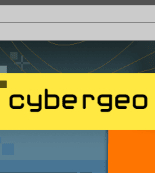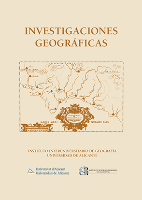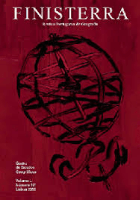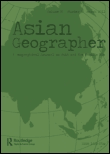
Geographia Polonica
metrics 2024
Elevating Geographic Scholarship Since 1972
Introduction
Geographia Polonica is a premier academic journal published by the Polish Academy of Sciences, Institute of Geography and Spatial Organization, renowned for its contributions to the field of geography and related disciplines. With a history spanning from 1972, it has evolved into a vital resource for researchers and professionals, addressing a wide spectrum of topics from cultural studies to urban planning and development. Geographia Polonica is indexed with impressive rankings in various categories, including a Q1 classification in Cultural Studies and significant positions in Earth and Planetary Sciences and Urban Studies, reflecting its influence and recognition in these critical areas. Although it operates under a traditional subscription model, its commitment to high-quality, peer-reviewed research ensures that the latest findings and advancements are accessible to the academic community. With its rich archival content and contemporary insights, Geographia Polonica serves as an essential platform for scholarly dialogue, making it an invaluable reference for students, researchers, and professionals eager to explore the complexities of spatial organization and geographical phenomena in a global context.
Metrics 2024
 0.27
0.27 1.10
1.10 1.50
1.50 23
23Metrics History
Rank 2024
Scopus
IF (Web Of Science)
JCI (Web Of Science)
Quartile History
Similar Journals

Geographia Cassoviensis
Connecting Scholars to the Heart of Geographical InquiryGeographia Cassoviensis, published by the Pavol Jozef Šafárik University, Faculty of Science, Institute of Geography, is a pivotal platform for scholarly exploration in the fields of Earth and Planetary Sciences and Geography. Established in 2016, this journal has rapidly developed into a valuable resource for researchers and practitioners seeking to understand the intricate facets of geographical and environmental dynamics. With an ISSN of 1337-6748 and an E-ISSN of 2454-0005, Geographia Cassoviensis is indexed in Scopus and holds a position in the Q4 quartile for both its submission categories as of 2023, reflecting its burgeoning impact within the scientific community. Located in Kosice, Slovakia, this journal invites contributions that further the discourse in geography, planning, and related environmental studies. Although currently not an open-access journal, it aims to foster a deeper understanding of geographical concepts and their applications across diverse realms, making it a vital resource for students, researchers, and professionals alike.

Atelie Geografico
Connecting Global Voices in Geography and Beyond.Atelie Geografico, published by the Instituto de Estudos Socio-Ambientais at UNIV FED GOIAS, serves as a crucial platform for the dissemination of research within the realm of Geography and related disciplines. With an ISSN of 1982-1956 and an e-ISSN of 1982-1956, this Open Access journal has been championing the free exchange of knowledge since 2007, making it accessible to a global audience of researchers, practitioners, and students. The journal's scope spans vital areas including Urban Studies, Management and Policy, Nature Conservation, and Tourism, highlighting its interdisciplinary approach to understanding socio-environmental dynamics. Despite its ranking in the Q4 category across several fields in 2023, the journal emphasizes the importance of emerging voices and innovative research, particularly as it converges towards exploring contemporary issues from 2019 to 2024. Located in Brazil, Atelie Geografico not only enriches the academic landscape but also responds to regional and global challenges, encouraging a diverse readership engaged in the critical study of environmental and social interactions.

Geographical Review of Japan-Series B
Exploring Japan's Geographic DynamicsGeographical Review of Japan-Series B, an esteemed publication by the Association of Japanese Geographers, serves as a vital platform for scholarly discourse in the field of geography, focusing on the nuanced socio-economic and environmental dynamics of Japan. With the ISSN 1883-4396, this journal aims to publish rigorous, peer-reviewed research that contributes to understanding Japan's geographic phenomena and informing policy-making. Although it is not an open-access journal, it provides insights accessible to researchers, professionals, and students seeking a deeper engagement with regional and international geographical discussions. With its commitment to excellence in academic contribution, the Geographical Review of Japan-Series B remains an essential resource for those dedicated to advancing geographical knowledge in Japan and beyond.

GEOJOURNAL
Fostering Insights in Planning and Regional DevelopmentGEOJOURNAL, published by SPRINGER, is a distinguished academic journal that occupies a pivotal role in the fields of geography, planning, and development. With a robust ISSN of 0343-2521 and an E-ISSN of 1572-9893, it has been a cornerstone of scholarly communication since its inception in 1977. Operating from the Netherlands, GEOJOURNAL offers insightful research articles that delve into the dynamics of spatial analysis, environmental management, urban studies, and regional development, thus catering to a diverse readership of researchers, professionals, and students alike. The journal boasts an impressive Scopus ranking of #176 out of 821 in its category, positioning it in the top 22% percentile while maintaining a Q2 quartile ranking in Geography, Planning, and Development as of 2023. With access options available, GEOJOURNAL remains a vital platform for disseminating cutting-edge research and fostering academic collaboration, indispensable for those engaging with contemporary geographic challenges and innovative solutions. Engage with GEOJOURNAL to enrich your understanding and contribute to critical discussions in this ever-evolving field.

Geoadria
Exploring the Interconnections of Earth and SocietyGeoadria, an esteemed Open Access journal published by the University of Zadar in Croatia, has been at the forefront of disseminating valuable research since its inception in 1996. With a keen focus on atmospheric science, demography, earth-surface processes, and geography, this journal serves as a crucial platform for researchers and professionals aiming to explore the intricate relationships between these fields. Although it currently holds a Q4 quartile ranking in various categories, such as Atmospheric Science and Geography, its commitment to promoting innovative scholarly dialogue ensures its relevance and utility within the academic community. Geoadria is indexed in Scopus, with rankings that reflect its ongoing contribution to the social sciences and earth sciences, notably garnering attention in niche areas. With a dedication to open access since 1996, the journal stands as a testament to the University of Zadar's commitment to enhancing global knowledge. Researchers, professionals, and students interested in geography, demography, and environmental sciences will find Geoadria a vital resource for the latest empirical studies and theoretical discussions.

CyberGeo-European Journal of Geography
Innovating Geography: Research Without BordersCyberGeo-European Journal of Geography, published by CYBERGEO, is a leading open-access journal that has been at the forefront of geographical research since its inception in 1996. With a dedicated focus on the multifaceted dimensions of geography, the journal aims to disseminate innovative and critical insights into geographical phenomena in Europe and beyond. The journal has established itself in the academic community, currently holding the Q3 quartile ranking in the Social Sciences (miscellaneous) category for 2023 and recognized within Scopus as #428 out of 604, placing it in the 29th percentile. CyberGeo publishes original research articles, thematic issues, and reviews that contribute to the advancement of geographical knowledge, making it an essential resource for researchers, professionals, and students alike. Situated in Paris, France, the journal embraces a truly international perspective and invites contributions that stimulate scholarly debate and further the understanding of spatial dynamics. By providing open access to its content, CyberGeo ensures that its research is accessible to a global audience, promoting knowledge sharing and collaborative exploration in the field of geography.

Biblio 3W-Barcelona
Empowering researchers in the realm of librarianship.Biblio 3W-Barcelona is a prominent academic journal published by the Universitat de Barcelona, Servei Publicacions, focusing on the dynamic field of library and information science. Established to foster scholarly communication, this journal provides a platform for researchers, professionals, and students dedicated to the advancement of bibliographic studies and library management. Despite lacking a current impact factor, Biblio 3W-Barcelona is recognized for its commitment to high-quality research and its contribution to the field, making it a valuable resource for those engaged in understanding the complexities of information dissemination in modern society. The journal features original research articles, critical reviews, and case studies that invite varied perspectives within the realm of librarianship. Readers can access its comprehensive body of work freely, enriching their knowledge and fostering practical applications in library science. For submission guidelines and further information, visit their website.

Investigaciones Geograficas-Spain
Advancing geographical knowledge for a sustainable future.Investigaciones Geográficas-Spain is an esteemed academic journal published by the Universidad de Alicante, dedicated to advancing the fields of geography, planning, and development as well as earth and planetary sciences. With its commitment to open access since 1983, the journal ensures that research is readily available to a global audience, facilitating knowledge dissemination and collaborative discourse. As reflected in its 2023 Scopus rankings, it holds a commendable position within the Q3 category in both Earth and Planetary Sciences and Geography, Planning and Development, making it a noteworthy resource for scholars and practitioners in these disciplines. The journal's scope encompasses diverse geographical research, aiming to address pressing environmental and societal challenges through empirical studies and theoretical advancements. By contributing to the knowledge reservoir from Spain and beyond, Investigaciones Geográficas-Spain serves as a vital platform for researchers, professionals, and students seeking to enrich their understanding of geographical phenomena.

Finisterra-Revista Portuguesa de Geografia
Exploring the Boundaries of Geographical KnowledgeFinisterra-Revista Portuguesa de Geografia is a distinguished academic journal published by the Centro de Estudos Geográficos, Universidade de Lisboa, since 1978, presenting a vital platform for research in the fields of Geography, Earth and Planetary Sciences. The journal operates under an Open Access model, encouraging broad dissemination of knowledge and ensuring that research is accessible to all, a commitment it has upheld since 2004. With a notable Q3 ranking in both Earth and Planetary Sciences (miscellaneous) and Geography, Planning and Development as of 2023, it serves as a significant conduit for scholarly discourse in these domains. The journal's scope reflects a diverse array of geographical studies, promoting interdisciplinary dialogue and research innovations, while its strategic publication history showcases its adaptability and relevance to contemporary issues. Researchers, professionals, and students alike are invited to engage with this pivotal resource that continues to shape geographical scholarship in Portugal and beyond.

Asian Geographer
Empowering Researchers with Insightful Geographical AnalysisAsian Geographer is a prominent journal published by Routledge Journals, Taylor & Francis Ltd, recognized for its significant contributions to the field of geography, planning, and development. With an ISSN of 1022-5706 and an E-ISSN of 2158-1762, the journal offers a platform for high-quality, peer-reviewed research that addresses vital geographical issues, particularly within the Asian context. The journal's commitment to fostering informed discourse is reflected in its Q2 category ranking in the field of Geography, Planning and Development as of 2023, and its Scopus ranking of #274 out of 821 in the same category, placing it in the 66th percentile. The Asian Geographer serves as an essential resource for researchers, professionals, and students alike, ensuring access to a wealth of knowledge that influences policy and practice. It continues to publish original research and reviews as it converges to present significant developments in geography from 1982 to 1987, 1991 to 1995, and from 2015 to 2024. This journal is vital for anyone looking to deepen their understanding of geographical dynamics in Asia and beyond.